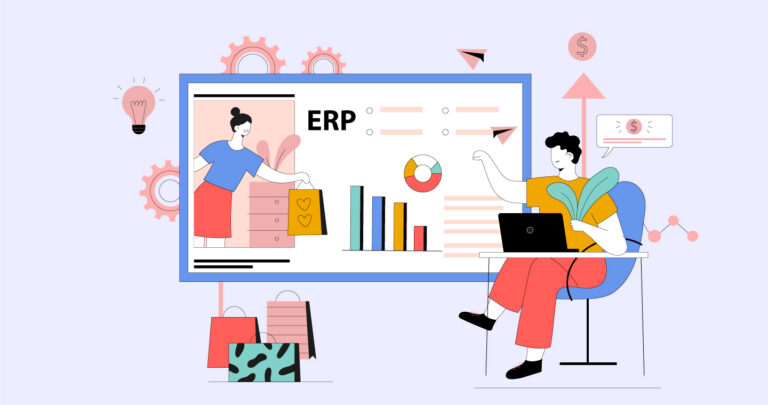Is it taking longer for your organization to reconcile the financial transactions at the end of the month? Are you a bit reliant on guesswork rather than hard facts and figures? Are your customers not satisfied with the service you are providing? If you have answered yes, then your ecommerce store needs an ERP software solution.
Always be mindful of the fact that no two companies are the same. The needs of your organization would always vary when compared to others. The ERP technologies improve your ecommerce business’s processes which lead to better management and efficiency. With the help of an ERP platform, you would be able to integrate important business functionalities like supply chain, HR, inventory management, etc. into a single system.
On the other hand, if you are growing an ecommerce business, you need to deploy ERP solutions to bolster your operational efficiency. As you expand your business operations, there is a serious need to opt for
ecommerce ERP solutions. With an effective ecommerce ERP solution, you would be able to avoid time-consuming paperwork assignments and other manual tasks.
ERP solutions can alleviate these strenuous tasks by facilitating a unified software solution for a majority of business activities. From inventory control and purchasing to shipping and beyond, ERP solutions can provide your business with a competitive edge. But deciding when it is time to consider implementing an ERP solution can be tricky.
Always remember that the best way to identify whether it is time or not for a new ERP solution is considering your ROI. So here is the list of signs which you need to consider while opting for the best ERP for ecommerce.
Your eCommerce Store Has Various Software Solutions For Single Purposes
To be precise, it is normal for an ecommerce store to operate various software solutions for single purposes. Things would be fine when you have low orders and sales from your customer’s end.

But with the spike in the demand of the customers, various functions such as finance, order fulfillment, inventory management, etc. can be difficult to manage if they run in different software platforms.
Always remember that these processes should work in tandem so that your organization runs smoothly. Let’s cite an example in this regard. Without precise sales data, inventory management may suffer greatly. This is exactly why you need an ERP platform for your business. With an ERP platform, you would be able to integrate these systems in a seamless manner.
Experiencing Issues With Management Of Orders
Without knowing the role of ERP in ecommerce, you wouldn’t be able to deploy it in the right manner. Also, note that keeping a tab on the special orders and drop shipments is always a bit difficult for those stores which have a large number of SKUs.
To ensure that your ecommerce store functions seamlessly, you have to make sure that your vendors process the orders in a timely manner. On the other hand, the purchase orders can be easily ignored which can lead to bad customer experience.
And as your sales volume increases, it is seemingly impossible to keep track of vendor orders manually. This is where ERP systems can be of great practicality. With an ERP solution, you would be able to cross-reference sales and buying data which would provide you with useful insights. Some of these insights are mentioned below.
- Get insights on purchase orders not confirmed from the vendor’s end
- Orders of customers that have yet not been shipped
- Drop shipments that are due for long
- The average lead times of the vendors and how they are fulfilling their promises
Note that when your inventories are back in stock, the ERP system would warn you regarding the same. In other words, there is no need of your team to manually monitor the various types of orders to ensure timely delivery.
Accounting Is Time-Consuming And Complicated
Irrespective of the nature of the business, accounting is the first department which benefits a lot from the implementation of an ERP system. We are well-aware of the fact that the days of the paper-based sales and invoices are long gone. And it hardly makes any sense to transfer data from a paper to an online system.

In simple words, there is a great risk of losing productivity at work. With ecommerce ERP integration, you would be able to execute operations in seconds when compared to manual processes. In short, you would be able to automate the whole accounting process which would allow you to concentrate on other important tasks.
Read More : 21 Features & Benefits Of NetSuite Accounting Software To Stay Ahead In Competition
Management Of Complex IT Processes
NetSuite for ecommerce is a single unified platform which would help you administer and manage different business functions. It can automate various functions and business processes leading to a greater amount of efficiency. But at the same time, if you have multiple systems across your ecommerce store, it is a bit difficult to manage them.
To ensure that all IT systems are working flawlessly, you have to opt for professionals who would ensure the integrity of these systems. All this can contribute to huge costs and waste of staff and resources. On the other hand, you also have to deal with system updates for individual software platforms.
These updates are time-consuming and can confuse you to a great extent. By opting for an ERP system, you would be able to keep these issues at bay. You would have access to a unified platform where managing business processes becomes easy.
Customers Are Providing Tons Of Negative Feedbacks
When you have a complete absence of stock or wrong pricing depicted on the product categories, it is quite normal that you would face the backlash of the customers. Also, note that the delayed delivery of the items can lead to dissatisfaction among the customers.
To be precise, these issues emanate when the sales, customer data and inventory are maintained separately. On the other hand, with NetSuite ecommerce services, every department in your ecommerce store can have access to unified data. Moreover, you can avail updated information which would help greatly in the proper synchronization of your ecommerce processes.
Difficulty In Finding The Key Business Metrics
If you have a manual system in place, then there it is common to expect various types of issues. For instance, it would be extremely difficult for you to obtain critical data about your store quickly. This usually makes decision making and reporting a challenging proposition.
However, with an ERP solution, you would be able to get a detailed view of your ecommerce operations at any point of time. For instance, your customer care representatives would be able to view the full transaction history of your clients. This usually helps them to improve their overall customer service which makes your ecommerce store popular.
Read More : 6 Amazing Benefits Of Netsuite And Ecommerce Integration

Conclusion
There is no denying the fact that siloed and independent business systems can add unnecessary burden. You need to be more efficient in your everyday ecommerce operations to satisfy customers. With an ERP like NetSuite for ecommerce, you would be able to fine-tune all your business operations.















